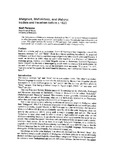| dc.contributor.author | Parsons, N. | |
| dc.date.accessioned | 2012-12-03T06:50:13Z | |
| dc.date.available | 2012-12-03T06:50:13Z | |
| dc.date.issued | 1997 | |
| dc.identifier.citation | Parsons, N. (1997) Makgowa, Mahaletsela, and Maburu: traders and travellers before c.1820, Pula: Botswana Journal of African Studies Vol.16, No.1, pp. 30 - 42 | en_US |
| dc.identifier.issn | 0256-2316 | |
| dc.identifier.uri | http://hdl.handle.net/10311/1102 | |
| dc.description.abstract | This article is about the way people of Tswana origin related with non Tswana speaking people and how they referred to them. It talks about how some of the non Tswana speaking people especially the Whites or Makgowa came into being as seen by the Tswana and other inhabitants of Southern Africa. The article also talks about trade, Traders and Travellers among the Tswana, other Africans in Southern Africa and the Whites (Makgowa,the Boers (Maburu), the Portuguese in Southern Africa. The barrier between "us" and "them" (or in postmodern-speak, "the other") in Sotho-
Tswana language is said to be most clearly demarcated by the mo-! ba- (singular! plural)
distinction in noun prefixes given to "us" people and the le-! ma- prefixes given to
"them" people. This being a mirror image of Nguni usage, where "us" are ama- and
"they" are abe-. | en_US |
| dc.language.iso | en | en_US |
| dc.publisher | Research and Development Unit, University of Botswana, http://www.ub.bw | en_US |
| dc.subject | 1820 | en_US |
| dc.subject | Traders | en_US |
| dc.subject | Travellers | en_US |
| dc.subject | Boers | en_US |
| dc.subject | Whites | en_US |
| dc.title | Makgowa, Mahaletsela, and Maburu: traders and travellers before c.1820 | en_US |
| dc.type | Published Article | en_US |

